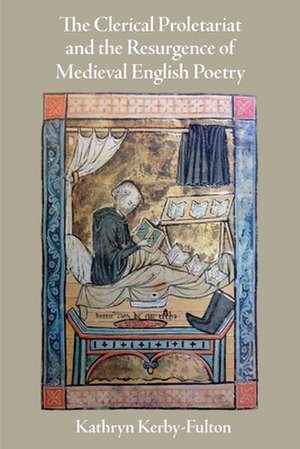The Clerical Proletariat and the Resurgence of Medieval English Poetry: The Middle Ages Series
Autor Kathryn Kerby–fultonen Limba Engleză Hardback – 27 mai 2021
Since English book production in London prior to 1380 was rare, Kerby-Fulton's study begins in the prior century with great regional poets, revealing their early experimentation with a new poetics of vocational crisis. Preoccupied with underemployment, patronage, careerist ambition, alienation, and changing literary fashion, these thirteenth-century writers were choosing the more avant garde option of writing in English while feeling backwards to earlier tradition in works such as Laȝamon's Brut and The Owl and the Nightingale. These early experimenters invoked semi-remembered literary forms in a still evolving written vernacular, breaking ground for Ricardian writers, who turned to these conventions during the massive clerical unemployment of the Great Schism era. Kerby-Fulton's is the first study of Langland's legacy of articulating an authorial employment crisis, and its echoes in Hoccleve and Audelay. It also uses new tools for uncovering proletarian writers in unattributed Middle English works, including the famous Harley 2253 lyrics, the "York Realist's" Second Trial from the York Cycle, St. Erkenwald, and Wynnere and Wastour. Taking in proletarian themes, including class, meritocracy, the abuse of children ("Choristers' Lament"), the gig economy, precarity, and the breaking intellectual elites (Book of Margery Kempe), The Clerical Proletariat and the Resurgence of Medieval English Poetry speaks to both past and present employment urgencies.
Din seria The Middle Ages Series
-
 Preț: 195.13 lei
Preț: 195.13 lei -
 Preț: 192.05 lei
Preț: 192.05 lei -
 Preț: 281.27 lei
Preț: 281.27 lei -
 Preț: 199.23 lei
Preț: 199.23 lei -
 Preț: 198.22 lei
Preț: 198.22 lei -
 Preț: 240.85 lei
Preț: 240.85 lei -
 Preț: 192.05 lei
Preț: 192.05 lei - 19%
 Preț: 509.33 lei
Preț: 509.33 lei -
 Preț: 245.45 lei
Preț: 245.45 lei -
 Preț: 232.87 lei
Preț: 232.87 lei -
 Preț: 286.76 lei
Preț: 286.76 lei -
 Preț: 192.05 lei
Preț: 192.05 lei -
 Preț: 247.43 lei
Preț: 247.43 lei -
 Preț: 231.78 lei
Preț: 231.78 lei -
 Preț: 193.04 lei
Preț: 193.04 lei -
 Preț: 191.00 lei
Preț: 191.00 lei -
 Preț: 216.43 lei
Preț: 216.43 lei -
 Preț: 267.27 lei
Preț: 267.27 lei -
 Preț: 285.64 lei
Preț: 285.64 lei -
 Preț: 285.64 lei
Preț: 285.64 lei -
 Preț: 248.56 lei
Preț: 248.56 lei -
 Preț: 323.44 lei
Preț: 323.44 lei -
 Preț: 197.18 lei
Preț: 197.18 lei -
 Preț: 230.41 lei
Preț: 230.41 lei -
 Preț: 243.06 lei
Preț: 243.06 lei -
 Preț: 154.43 lei
Preț: 154.43 lei -
 Preț: 191.00 lei
Preț: 191.00 lei -
 Preț: 317.31 lei
Preț: 317.31 lei -
 Preț: 406.68 lei
Preț: 406.68 lei - 11%
 Preț: 439.33 lei
Preț: 439.33 lei -
 Preț: 183.69 lei
Preț: 183.69 lei -
 Preț: 285.88 lei
Preț: 285.88 lei - 19%
 Preț: 363.86 lei
Preț: 363.86 lei -
 Preț: 242.82 lei
Preț: 242.82 lei -
 Preț: 290.05 lei
Preț: 290.05 lei - 19%
 Preț: 420.74 lei
Preț: 420.74 lei - 23%
 Preț: 538.83 lei
Preț: 538.83 lei -
 Preț: 458.15 lei
Preț: 458.15 lei - 30%
 Preț: 406.56 lei
Preț: 406.56 lei -
 Preț: 232.58 lei
Preț: 232.58 lei - 19%
 Preț: 365.58 lei
Preț: 365.58 lei -
 Preț: 198.22 lei
Preț: 198.22 lei -
 Preț: 322.52 lei
Preț: 322.52 lei -
 Preț: 174.65 lei
Preț: 174.65 lei -
 Preț: 405.32 lei
Preț: 405.32 lei -
 Preț: 243.06 lei
Preț: 243.06 lei -
 Preț: 428.40 lei
Preț: 428.40 lei - 19%
 Preț: 415.74 lei
Preț: 415.74 lei -
 Preț: 239.77 lei
Preț: 239.77 lei
Preț: 565.47 lei
Preț vechi: 612.06 lei
-8% Nou
108.21€ • 115.71$ • 90.22£
Carte indisponibilă temporar
Specificații
ISBN-10: 0812252632
Pagini: 432
Dimensiuni: 162 x 238 x 34 mm
Greutate: 0.77 kg
Editura: Wiley
Seria The Middle Ages Series
Cuprins
Contents
Preface. "Decidedly not the national language"
Introduction. The Clericus Class, Underemployment, and the Golden Age of Middle English Poetry
Part I. Clerical Proletarians and the Resurgence of English Poetry: Vocational Crisis and Self-Representation
Chapter One. Precedents for Clerical Crisis and Authorial Intervention in Early Middle English
Chapter Two. Poetry of Vocational Crisis in Langland's Apologia and the Early Langlandian Tradition
Chapter Three. Career Disappointment and Langlandian Tradition I: Hoccleve's Missed Opportunity and Self-Portraiture in Vocational Crisis
Chapter Four. Career Disappointment and Langlandian Tradition II: John Audelay as the Voice for a Lost Generation
Part II. The Liturgical and Ecclesiastical Proletariat Resurgent and English Verse
Chapter Five. Cathedral Songs: Lyric Genres of the Choral Service Class and the Resurgent English
Chapter Six. Satire, Drama, and Censorship: Submerged Literary Circles at the Cathedral
Chapter Seven. The Clerical Proletariat and Public Genres of the Cathedral World: St. Erkenwald as a St. Paul's Text
Conclusion. The Poet as Public Intellectual: Achievements and Characteristics of Proletarian Writers
Notes
Index
Acknowledgments
